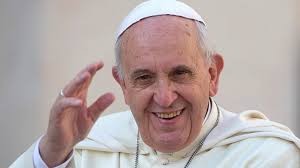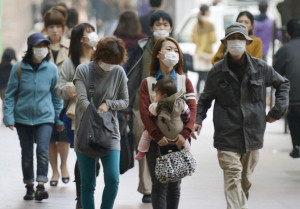The Bergoglian School of Economics
by Bill Ulivieri
(The views and opinions expressed in this article are those of the author and do not necessarily reflect the official policy or position of any agency, the U.S. government or the Vatican. Examples of analysis performed within this article are only examples.)
For those who haven’t heard, Pope Francis wrote an encyclical on the environment called Laudato Si, which means “Praise to You”. The opening paragraph gets right to the point. 
“…Saint Francis of Assisi reminds us that our common home is like a sister with whom we share our life and a beautiful mother who opens her arms to embrace us.”, [Laudato Si , #1] and “This sister now cries out to us because of the harm we have inflicted on her by our irresponsible use and abuse of the goods with God has endowed her”.[Laudato Si #2]
Many people like to think of this document as a “tree hugging” document on the environment, but that may be the least significant part of it. It’s more about the economy, the “invisible” forces of the stock market and business.
Anyone who owns a business should read this encyclical. I am going to summarize in my own words the document and then circle the wagons back in more detail.
First, we have to admit there is a problem
We have to admit the environment is being exploited globally. Things may not be so bad here in the United States of America, but back in 1968 the Cuyahoga River in Northern Ohio caught on fire from a floating oil slick. When I was a teenager in 1977, we were not allowed to swim in Lake Erie because it was so polluted.
Air pollution is making its way from China across the Pacific Ocean to California. Wildfires in Northern Minnesota several years ago gave my wife an asthma attack 560 miles away in Glenview, Illinois. Many people now suffer from multiple chemical sensitivity syndrome.(MCS, www.aafp.org)
 It’s a known fact we’re laying waste to the jungles and cutting the down rain forests. Numerous rivers are polluted in China from industrial waste. Air pollution is so bad, many people wear masks in China and Japan. But this pollution just isn’t confined to other continents. It’s in Green Bay, Wisconsin with issues stemming from polychlorinated biphenyls or PCB’s and agricultural waste in the Fox River. It’s along the shores of Lake Michigan with agricultural waste flooding from dairy farms on the west bank.
It’s a known fact we’re laying waste to the jungles and cutting the down rain forests. Numerous rivers are polluted in China from industrial waste. Air pollution is so bad, many people wear masks in China and Japan. But this pollution just isn’t confined to other continents. It’s in Green Bay, Wisconsin with issues stemming from polychlorinated biphenyls or PCB’s and agricultural waste in the Fox River. It’s along the shores of Lake Michigan with agricultural waste flooding from dairy farms on the west bank.
(photo courtesy http://www.japantimes.co.jp/news/2013/03/10/national/yellow-sand-chinese-pollutants-wreak-havoc/)
It’s homemade signs posted along farm roads in Wisconsin that say “Manitowoc: Where the “M” is for Manure”. Bees no longer pollinate flowers and crops because of a neurological conditioned believed to be caused by genetically modified grain, where the weed killer and pesticide is genetically added to the DNA of corn, wheat and soybeans.
But all those effects are not some kind of external issue we need to try to fix.
Mankind is not outside spectator in all this. Environment problems are manifestation of the desolation and corruption within our own soul.
Pope Francis writes; “When we speak of the “environment”, what we really mean is a relationship existing between nature and the society which lives in it. Nature cannot be regarded as something separate from ourselves or as a mere setting in which we live. We are part of nature, included in it and thus in constant interaction with it. Recognizing the reasons why a given area is polluted requires a study of the workings of society, its economy, its behavior patterns, and the ways it grasps reality.” [Laudato Si #139]
If the rainforests are turning into deserts; it’s because our soul is a parched desert. If lakes and streams are not safe to drink; it’s because we’ve been drinking from the well of materialism and consumerism. If children pick food from garbage dumps in Mexico, society is not embracing the Church’s teaching on solidarity and the universal destination of goods.
Until we have a personal, internal, (dare I say it) religious conversion will we properly care for our common home. Only then can we make real progress in making the Earth a sustainable home.
Relying on the force of law, trading carbon credits, monetary fines in global accords, and shooting paint balls at whaling ships isn’t going to do it. There is no amount of taxes and monetary fines going to get us to a sustainable Earth. Each one of us has to have an interior conversion. Pope Francis says that every created being has in it, a reflection of the Trinity.
Call for Interior Conversion
“For Christians, believing in one God who is trinitarian communion suggests that the Trinity has left its mark on all creation. Saint Bonaventure went so far as to say that human beings, before sin, were able to see how each creature “testifies that God is three”. The reflection of the Trinity was there to be recognized in nature “when that book was open to man and our eyes had not yet become darkened”. Pope Francis goes on to say,
“The Franciscan saint teaches us that each creature bears in itself a specifically Trinitarian structure, so real that it could be readily contemplated if only the human gaze were not so partial, dark and fragile. In this way, he points out to us the challenge of trying to read reality in a Trinitarian key. [Laudato Si #239]
In other words, we have to see the hand of God in every created being.
What It Means For The Stock Market and Global Economy
From 1926 until 1980, the stock market returned on average about 8.40% each year. That’s when the USA did
everything domestically. We had manufacturing, a strong financial services industry, plenty of jobs and a pretty good standard of living. We were naturally more concerned about stake holders; that is, employees and local community.
Starting in the 1980’s, we began to focus on the share holder value. All we wanted to do was increase the bottom line and shareholder value in company stock. We shipped manufacturing overseas, outsourcing labor and financial services, imported low wage immigrant labor. Whatever it takes to improve the bottom line.
Basically we outsourced expenses and liabilities to Mexico, China and Japan, while keeping the income side of the balance sheet here in the United States. Call it global arbitrage. Guess what? The stock market has returned about 8.40% percent per year since 1980.
In order to have a sustainable domestic economy and thriving stock market, we need to return to a stake holder mentality. We need to focus on customer service, building community and not overly obsess about shareholder value. We can still achieve an attractive rate of return for investors.
The essence of the Churches’ teaching on subsidiarity says we can’t do any sustainable, efficient good on a federal or global level, unless we seek to solve problems on a local level. On a human level.
What would happen if we put Laudato Si into practice?
In my opinion, Pope Francis has a love / hate relationship with capitalism. On one hand, he understands the tremendous power of public demand, marketing and how it influences corporate changes in manufacturing. On the other hand, there is no possible way for societies which embrace atheistic communism, Marxism or Socialism can solve climate change and environmental devastation.
What do you think the outcome would be if global businesses around the world worked fully to eliminate needless waste, save and invest more hard earned dollars, embraced customer service, incurred less debt, all while doing everything in their power to create a sustainable local economy?
About the Author
Bill Ulivieri has been in the financial services industry since 1980. In 2004, he co-founded a registered investment advisory firm that specializes in providing portfolio management to individual investors using Exchange Traded Funds. Bill also provides independent investment advice, hedging and “benchmarking” to individual company 410(k) and 403(b) retirement plans.
Visit www.cenaclecapital.com for more information
